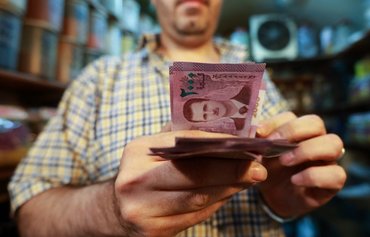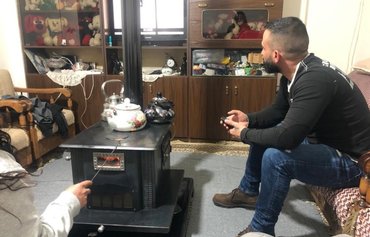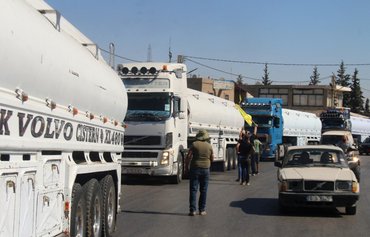By smuggling goods into Syria, Lebanese Hizbullah is violating the US sanctions imposed on the Syrian regime and its backers.
The Caesar Syrian Civilian Protection Act of 2019 seeks to prevent the normalisation of the regime of Syrian president Bashar al-Assad without accountability for human rights abuses.
The black market in Syria relies on goods smuggled from Lebanon, particularly medicine, fuel and food, Syrian economist Mahmoud Mustafa told Diyaruna.
These items are sold by people close to the regime and regime officials at very high prices, sometimes as much as 10 times their original price, he said.

This still from a video shows one of the border crossings between Lebanon and Syria in northern Lebanon.
Much of the revenue from black market sales ends up in the regime's coffers to "make up for the shortfall in cash resulting from the financial crisis", he said.
The illegal trade goes in both directions, Mustafa noted, with Syrian smugglers also bringing goods into Lebanon via the same network.
Foodstuffs are smuggled into Lebanon via Hizbullah affiliates and sold for double the price, he said, thus securing additional illegal revenue streams for the Syrian regime in foreign currency that help it withstand the sanctions imposed on it.
Mustafa noted that most of the goods smuggled into Lebanon are basic food items that the Syrian people need themselves.
These are sold at high prices and in US dollars, which provides the Syrian regime with additional revenue in hard currencies, he said.
Increasing Syrians' suffering
The Caesar Act has tightened the screws on the Syrian regime by blocking the outlets through which it has sought to obtain funds, political researcher Abdul Nabi Bakkar told Diyaruna.
The systematic smuggling operations Hizbullah has carried out in Syria represent a "clear violation of the Caesar Act, since these operations ensure continuous cash flow to the regime's officers and its treasury", he said.
These funds will help the regime stay afloat, Bakkar said, noting that Syrian civilians have suffered for many years under its control.
Hizbullah's role in organising the smuggling operations and providing smugglers with protection "exposes it directly to Caesar Act sanctions, which will then impact the Lebanese economy", he said.
This is top of the harm inflicted on Lebanon by the smuggling operations, which have seen government-subsidised goods being sold in Syria, he added.
In addition to overseeing illegal crossings, Hizbullah has pulled its fighters from some areas to clear the way for smugglers to operate under its protection, said Salah Mansour, who is related to a former senior Hizbullah official.
Mansour had been close to the party's leadership in the Bekaa Valley before splitting from the group.
Items transported into Syria include petrol, mazout (fuel oil), and medicines pulled from pharmacies in Lebanon, he told Diyaruna.
They also include flour, bread and many other food items, often sold at double the price in Syria by regime loyalists and officers of the regime's army, he said.
The smuggling operations are currently focused on gasoline and mazout and on transporting the largest amount possible of those commodities before the subsidies are lifted by the Central Bank of Lebanon, Mansour said.
The lifting of subsidies "will impede the smuggling process because that will raise the prices of gasoline and mazout to levels that Syrian citizens cannot afford", he added.

![These boxes of tobacco seized in Lebanon had been destined for Syria. [Photo via Hona Beirut]](/cnmi_di/images/2020/10/21/26620-Syria-tobacco-smuggling-600_384.jpg)






